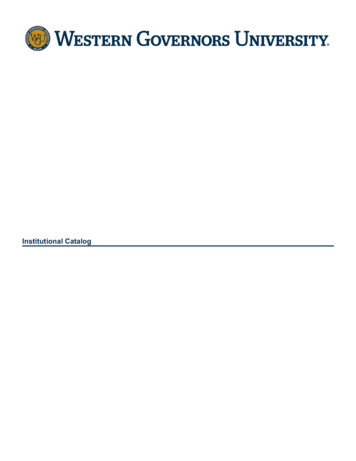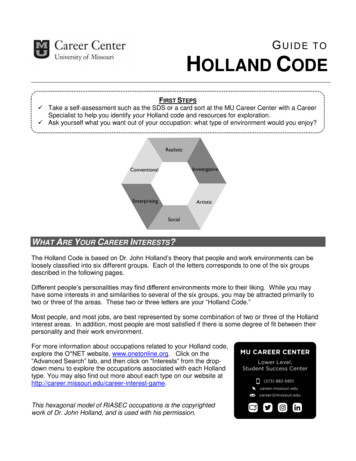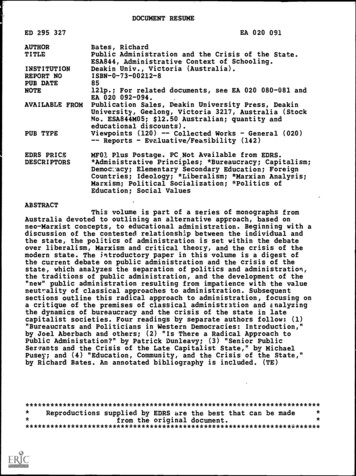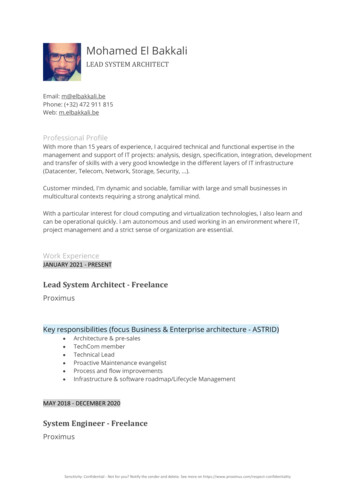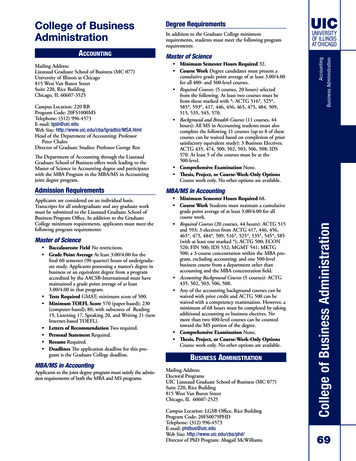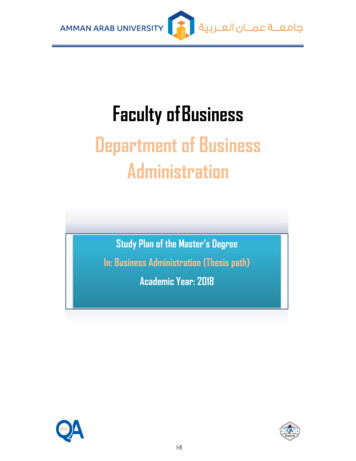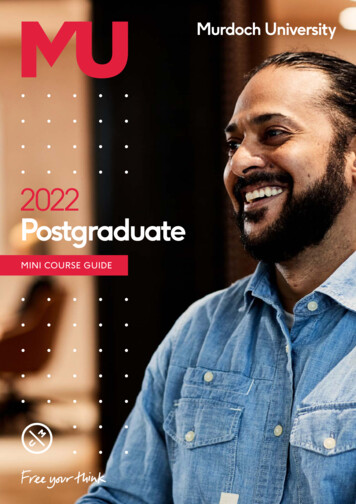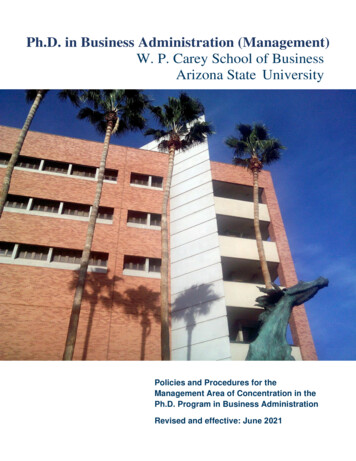
Transcription
Ph.D. in Business Administration (Management)W. P. Carey School of BusinessArizona State UniversityPolicies and Procedures for theManagement Area of Concentration in thePh.D. Program in Business AdministrationRevised and effective: June 2021
These policies and procedures are intended to be consistent with bothUniversity and W. P. Carey School of Business policies and proceduresgoverning doctoral student coursework. Students are responsible forfulfilling university and school requirements, some of which will not bedescribed in this document. Materials contained in this document aresubject to revision without prior notification at the discretion of thedepartment.Program applicants desiring further information should contact:Dr. Jeff LePineManagement Doctoral CoordinatorW. P. Carey School of BusinessArizona State UniversityTempe, AZ 85287-4006(480) 965-8652jeff.lepine@asu.eduCover photo by Kevin Dooley, CC BY 2.0
1TABLE OF CONTENTSI. Introduction . .3II. Entrance requirements . .3-4III. Plan of study . 4A. General overview of course requirements .4B. Program advisor . . 4-5C. Basic program (min 12 credit hours) . . .5D. Advanced program (min 30 credit hours) . 51. Management core modules (12 credit hours) . 5a. Macro seminar: Strategic management . .5-6b. Micro organizational behavior (OB) seminar . .6c. Macro seminar: Organizational theory . 6d. Meso organizational behavior seminar . 62. Specialty management modules (min 3 credit hours) . .6-73. Research methods modules . . .74. Additional coursework (min 9 credit hours) . 7E. Supporting coursework (min 30 credit hours) . .7F. Dissertation (12 credit hours) . .7IV. Additional program requirements .7A. Graduate College and School of Business requirements . .71. Graduate College satisfactory academic progress policy .82. Satisfactory academic progress requirements specific to the School of Business .8-9B. Specific department-level requirements for doctoral students .91. First- and second-year major papers .92. Colloquia and job talks .93. Informal seminars .94. Proposal and dissertation defenses . .95. Program duration 96. Publication aspirations .9-107. Conference submission aspirations . .10C. Graduate assistantships .10D. Development of teaching competence .10-11E. Orientation of new students .11F. Yearly progress report and feedback to students .11-12G. Comprehensive examination .121. Sequence, Timing, and Eligibility . 122. Administration . .123. Comprehensive exam committee 12-134. Grading .135. Notification of the exam results . 136. Academic integrity 13H. Dissertation .141. The dissertation committee .142. Preparation of the dissertation .14a. Research plan and proposal defense for a traditional dissertation .14b. Guidelines for a “three-paper option” dissertation .14-163. Candidacy . .164. Enrollment in dissertation credit hours . 165. Work on the dissertation while off campus . . .166. Defense of the dissertation .16-177. Dissertation process duration and time limitations .178. Completion of the program .179. Academic integrity .17
2V. Miscellaneous .17A. Leave of absence .17-18B. Criteria for nomination to consortia .18C. Use of department equipment, supplies, facilities, mailroom, and telephones .18D. Office space assignments .18E. Summer support 18F. Travel support .18-20G. Student Resources .20H. Master of Science in Passing 20-21APPENDICESA. Plan of study quick reference sheet . .22B. Suggested quantitative methods courses . .23C. Core management topics .24-25D. Sample self-report annual review form . . .26-27E. Sample doctoral student annual progress review—faculty form .28-29F. School of Business probation & dismissal policy . .30-32Probation and Dismissal Sample Letters 32G. Sample timeline for Ph.D. completion . 33-34
3I: INTRODUCTIONThe Department of Management & EntrepreneurshipThe Department of Management & Entrepreneurship (also called “the department”) at Arizona State University is oneof seven departments and schools within the W. P. Carey School of Business. The research and teaching of itsfaculty members primarily cover the areas of Organizational Behavior and Strategic Management, with secondarycoverage of Human Resource Management and Organizational Theory. Faculty members publish their research injournals such as Academy of Management Journal, Academy of Management Review, Administrative ScienceQuarterly, Journal of Applied Psychology, Organization Science, Personnel Psychology, Strategic ManagementJournal, and many others.The Doctoral ProgramThe department offers students the opportunity to obtain a Ph.D. in business administration with a concentration inmanagement. Although management is a broad field, our doctoral program is best suited for those students interestedin specializing in organizational behavior and/or strategic management. The doctoral program places primaryemphasis on the development of high-quality scholarship, focusing first and foremost on research competence andsecondarily on teaching, as a vehicle to academic professionalism. The mission of the program is to provide anenvironment that is conducive to the development of scholars who are prepared to assume the diverseresponsibilities of tenure-track faculty positions at leading research universities.Doctoral students (also called “Ph.D. students”) in our program are encouraged to design an individually meaningfulcourse of study within the larger context of our field. Opportunities for doing this are available through coursework,research with faculty members, and independent research and study. Students in the department’s Ph.D. programselect a series of modules in organizational behavior, strategic management, human resource management,organizational theory, and research methods. Students develop additional focus and expertise through collaborationon research papers with individual faculty members. Ph.D. students typically have one or more publications prior tograduation.We require doctoral students to commit full-time attention to our program, especially until they have successfullydefended the dissertation proposal (see IV.H. Dissertation). Full-time enrollment entails a minimum of six credithours of coursework during the Fall & Spring semesters (the six hours cannot include audit enrollment). To reachthe required total of 84 credit hours for the program, most students take 9 to 12 credit hours per semester. Inaddition, students work closely with faculty members, both as part of their assistantship and independently. Weprovide a great deal of individual attention to the mentoring of our students.Full-time enrollment in the doctoral program is necessary to develop the skills and values for effective scholarship.Doctoral students generally learn research and teaching skills best by serving as apprentices to experienced scholars.Thus, an integral part of doctoral education is employment as a graduate assistant. In addition, full-time attendancefacilitates the formation of collegial relationships between faculty and students. As our overarching goal is to preparestudents for positions in leading research universities, we are unable to fully serve the interests of students who donot intend to pursue research careers in the academic community.II: ENTRANCE REQUIREMENTSEntrance to our program is based on the following criteria: A completed application for admission to graduate studies at ASU. College transcripts showing grades received while pursuing all prior undergraduate degrees and graduatedegrees. Entrance examination scores. We prefer that you submit GMAT scores, but we will also consider GREscores. Scores up to five years old (from the date of application) are acceptable. Applicants whose
4 native/official language is not English must submit TOEFL, IELTS, or PTE scores. English proficiency testscores are only valid if taken within two years prior to the semester of application.Three letters of reference from college faculty members, work colleagues, or other individuals who are ableto appraise your personal interests, abilities, and the likelihood that you will successfully complete ourPh.D. program.A written statement that discusses your personal career objectives, rationale for pursuing a Ph.D. inmanagement in general and at ASU in particular, types of research and coursework you plan to pursue,and what you plan to do after receiving your Ph.D.A resume or summary of your prior work experience, both paid and unpaid.The prerequisites for admission to the Ph.D. program are a Bachelor’s degree (in any field) and acomputer literacy course (or equivalent experience). Although a prior graduate degree is not required foradmission, previous Master’s or Ph.D. level work will be considered a plus during the committee’sconsideration for admission.The Department Ph.D. Committee, which consists of four to six faculty members in the department, screens theapplications. Applicants passing the initial screening will be called for a phone interview. Members of thecommittee may also have follow-up communication with letter of reference writers. In reviewing applications, thecommittee considers the entire profile of the applicant, including standardized test scores, transcripts, experience,the personal statement, and letters of recommendation. Because of the highly individualized nature of Ph.D.training and the importance of mentorship, we place particular emphasis on the fit between what our programoffers, both in terms of content that is taught in our seminars and the research interests of faculty who areavailable to work with doctoral students, and an applicant’s research and teaching interests. The Ph.D. Committeethen makes admission recommendations to the Chair of the department, and, if approved, the admittancerecommendation is forwarded to ASU Graduate College for approval. After Graduate College admits theapplicant, the Chair of the department writes a letter to the applicant that outlines an offer of financial support.We only consider applications in the fall/early winter for admittance in August; we do not have a rolling deadline.We normally admit two to four students per year to preserve a low faculty-to-student ratio. Our admissionsprocedures conform to the equal opportunity and affirmative action policies of ASU.III: PLAN OF STUDYThe Plan of Study in the Ph.D. program is designed to prepare students to teach and conduct scholarly research ina specialized area of concentration in management.III. A. General Overview of Course RequirementsThe doctoral program consists of a minimum of 84 credit hours of approved graduate work (see Appendix A),including a minimum of 12 hours in the basic program, a minimum of 30 hours in the advanced program, 30 hoursin supporting coursework, and 12 hours of dissertation (799) credits.III. B. Program AdvisorEach student must have a program advisor during the first year of graduate study. The program advisor is typicallyone of the two formal mentors assigned by the Chair of the department, but it also can be the department’s Ph.D.Program Coordinator. The program advisor must be approved by the Dean’s office in the W. P. Carey School ofBusiness upon recommendation by the Chair of the department.The program advisor’s primary responsibility is to work with the student to formulate a curriculum (includingcoursework and research projects), which is subsequently reflected in the Individual Plan of Study (iPOS) thatmeets the student’s unique interests within the constraints imposed by school and university requirements. Withthe help of the advisor, the student decides on an area of specialty or concentration and chooses appropriate
5coursework and research experiences to support that decision. The advisor, along with assigned formal mentors,also monitors student progress (see IV.F. below), and provides feedback to students regarding that progress. Theadvisor may be distinct from the student’s dissertation committee (see IV.H.1 below), which is formed prior totaking the comprehensive examination (see IV.G. below, however, this committee can be amended prior to thedissertation proposal defense). A student must have an approved plan of study prior to beginning the secondsemester of coursework in the Ph.D. program.III. C. Basic Program (minimum of 12 credit hours)According to W. P. Carey School of Business guidelines, the basic program consists of a minimum of 12 credithours of coursework. The courses composing the basic program are intended to provide the foundation foradvanced study in the management area of concentration and supporting coursework. As such, the student’s first24 credit hours in his or her program of study should consist of at least 12 credit hours from the basic program.This requires at least: For strategic management/macro students, 3 credit hours of graduate level coursework in economics (ECN502 may not be used to satisfy this requirement). For organizational behavior students, 3 credit hours ofgraduate level coursework in a foundational discipline such as psychology, sociology, or communication.Six credit hours of coursework in quantitative methods (ECN 502 or CIS 502 may not be used to satisfythis requirement).Three credit hours of coursework in the behavioral sciences (for organizational behavior students, this is inaddition to the foundational work in #1 above). This requirement can be fulfilled by taking courses outsideof the department in foundational disciplines such as psychology, sociology, economics, orcommunication.III. D. Advanced Program (minimum of 30 credit hours)The advanced program consists of a minimum of 30 credit hours and complies with the W. P. Carey School ofBusiness guidelines, which require a minimum of 15 credit hours in a single program area (management) and aminimum of 9 credit hours in 700 level seminars, excluding independent studies (790) or research (792).The advanced program, detailed below, includes the four management core modules (three credit hours each), atleast two specialty management modules (one credit hour each), and three research method modules (two threecredit hour seminars and a one credit module in research ethics). The additional nine credit hours of supportingcoursework may be fulfilled with additional specialty modules or other coursework. The specific courses takenbeyond the core modules represent the student’s area of specialization and are selected by the student with the helpof the program advisor and mentors. The plan of study must be approved by the student’s program advisor, the headof the academic unit and the Dean of Graduate College.III. D. 1. Management Core Modules (12 credit hours)All students will take the following core modules: (these three-credit seminars are each 15 weeks in length,offered every other year, and are typically completed during the first two years of study.)III. D. 1. a. Macro Seminar: Strategic ManagementThis survey seminar examines foundational theories as well as contemporary work in strategic management. The aimis to provide a survey of the strategic management field, from theory and research on the effectiveness of businesslevel strategies and managing competitive dynamics to create competitive advantage, to theories and research on thestrategies of large multi- product firms, how they are governed, and how the portfolio of businesses is managed.Topics include industrial economics' influence on strategy, and transaction cost, agency, resource dependence,
6network, and resource-based view theories. We explore alliances, diversification, governance, socio-cognitiveapproaches, and strategy process.III. D. 1. b. Micro Organizational Behavior (OB) SeminarThis survey seminar examines theory and research on organizational behavior that is focused on the individual asthe primary unit of analysis. The seminar will cover both classic topic areas as well as those that are morecontemporary. The module will provide a preview of core OB topics such as job performance, organizationalcitizenship behavior, commitment, motivation, job attitudes, trust, justice, perception, learning, decision- making,stress, and individual differences in personality and cognitive ability.III. D. 1. c. Macro Seminar: Organizational Theory (OT)This survey seminar examines the major theoretical approaches to the field of organizational theory.Organizational theory pertains to understanding how organizations—which are ubiquitous in contemporary humanexperience—form, grow, change, interact, influence, and make decisions and respond to problems internal andexternal to their boundaries. Topics include “old” and “new” institutional theories; organizational learning, attention,and decision making; sensemaking and enactment; social evaluations, including reputation, status, and legitimacy;upper echelons perspective; organizational ecology; and the social movement perspective. We explore rational,natural, and open systems views of organizations.III. D. 1. d. Meso Organizational Behavior SeminarMeso organizational behavior theory and research simultaneously studies at least two levels of analysis includingindividual, group, and organizational levels and the links between these levels. The objective of this seminar is toreview theories and research that synthesize micro and macro organizational process. The topics of this seminarinclude the meso building blocks of multilevel theory, context, process, and time, and the specific content areas ofrelational perspectives, social networks, groups/teams, power and politics, leadership, organizationalculture/climate/identity, and the future of work.III. D. 2. Specialty Management Modules (minimum of 2 credit hours)Other modules are offered that cover specialized areas in management and research methods, or that “dive deeper”into important issues that were covered only briefly in the core seminars. Students must take a minimum of two onecredit seminars (each five weeks in length) within the first two years of study. However, to promote continuousdevelopment of scholarly knowledge and skill, students in years three through five are highly encouraged to takeadvantage of the specialty management modules that are offered.Examples of specialty management modules include:General Theory BuildingResearch Methods Topics Qualitative Research Research Ethics Analysis of Mediation and Moderation Meta-analysis Multilevel Research Design and AnalysisOB Topics (Micro/Meso) Organizational Attachment Mood and Emotion Organizational Culture
7 Leadership in Organizations Organizational Dysfunctions Organizational Learning, Change, and InnovationMacro Topics (Strategy/Organization Theory) Strategy Development and Implementation Alliance and Network Strategies International Strategy Corporate Governance Economic Theories of Organization Institutional TheoryIII. D. 3. Research Method Modules (7 credit hours)All students will take the two three-credit seminars in research methods offered by the Management Department:Research Methods I and Research Methods II as well as one one-credit Research Ethics seminar. These seminarsintroduce a variety of research designs, methods, and ethics commonly used in management and organizationalresearch. The topics covered include the scientific process and philosophy of science, formulating researchquestions, measurement validity and reliability, laboratory and quasi-experimentation, survey research, case studyresearch, qualitative methods, longitudinal designs, cross-level designs, measurement issues in cross-cultural andinternational management research, and various data analysis techniques.III. D. 4. Additional Coursework (minimum of 9 credit hours)A minimum of nine credit hours of coursework must be taken to support the student’s advanced plan of study. Allsupporting coursework must be in graduate (502 and above) level courses. In general, only three credit hours ofsupporting coursework in 590, 592, 790, or 792 courses should be used towards satisfying the nine-hour minimum,although exceptions can be made with approval from the Ph.D. Coordinator.Supporting courses depend on the student’s chosen area of specialization and should be used to support that choice.Courses may be taken in any department or college within the university. Many students find supporting courseworkin Economics, Finance, Psychology, Sociology, Communications, and Marketing. In addition, some courses at otheruniversities may be taken with approval from the Ph.D. Coordinator.III. E. Supporting Coursework (minimum of 30 credit hours)Once minimum program requirements are met, remaining credit hours may be taken with elective courses. Studentswith previous graduate coursework may use up to 30 credit hours of that coursework to satisfy these requirements,subject to the approval of the Ph.D. Committee and Graduate College. (Note: these are 30 semester or trimestercredit hours. For students transferring in credits from quarter programs, the credit hours may not be equivalent.)III. F. Dissertation (12 credit hours)See “Dissertation” (IV.H.)IV. ADDITIONAL PROGRAM REQUIREMENTSCoursework is only part of the process of completing the Ph.D. program in management. This section containsinformation about additional aspects of the program.IV. A. Graduate College and W. P. Carey School of Business Requirements
8IV. A. 1. Graduate College Satisfactory Academic Progress Policy(as outlined in raduate-policies-and-procedures 032019 0.pdf)a. All graduate students are expected to make systematic progress toward completion of their degree. Thisprogress includes satisfying the conditions listed below, and achieving the benchmarks and requirements setby the individual degree programs (see IV.A.2 below). Maintain a minimum of 3.00 GPA on both the iPOS GPA (calculated from all courses that appear onthe student’s approved iPOS) and Graduate GPA (calculated from all courses numbered 500 or higherthat appear on the transcript). If either GPA falls below 3.00, the student must develop, with theiradvisor, an academic performance improvement plan that includes the conditions and timeframes formaking satisfactory academic progress in their degree program. Satisfy the maximum time limit for graduation from the Ph.D. (10 years from admission) and complywith the five-year time limit for graduation after passing the comprehensive examinations, whichever isshorter. Stay continuously enrolled in their degree program. Failing to do so without a Graduate Collegeapproved Request to Maintain Continuous Enrollment is considered to be lack of academic progress andmay lead to automatic dismissal of the student from the degree program. Persistent “W” and “I” gradesduring multiple semesters on a plan of study or transcript may reflect lack of academic progress. Successfully pass comprehensive exams, qualifying exams, and/or foreign language exams. Successfully complete the oral defense of the proposal for the dissertation. Successfully complete the Dissertation and the oral defense of the Dissertation.b. Students are responsible for verifying additional satisfactory progress policies as required by their degreeprogram.c. If a student fails to satisfy the requirements of their degree program and/or the benchmarks outlined above,the student may be placed on probation or dismissed from the program based on the Academic Unit’s(department’s) recommendation to Graduate College. The Dean of Graduate College makes the finaldetermination.IV. A. 2. Satisfactory Academic Progress Requirements Specific to the W. P. Carey School of BusinessIn addition to the above Graduate College requirements for satisfactory progress, Ph.D. students are required tosatisfy the following conditions for satisfactory progress as set by the W. P. Carey School of Business DoctoralCommittee: Academic Integrity. A student who engages in academic misconduct as outlined in ASU’s academic integritypolicy (https://provost.asu.edu/academic-integrity) while attending the W. P. Carey School of BusinessPh.D. program will be subject to strict penalties. Those penalties may range from a full two-letter reductionin final course grade (at a minimum) to expulsion from the program and School of Business. All allegationsof academic misconduct must be reported to program administrators. Any subsequent act of academicmisconduct, regardless of severity, will result in dismissal from the program and the School of Business.Pass all courses. Grades of “D” or “E” are not considered passing grades for Ph.D. students. At any pointwhile pursuing their Ph.D. degree, a student who receives a grade of “D” or “E” in any course will not bepermitted to continue coursework. If a student is currently on probation, the student will be recommended fordismissal to Graduate College. If the student is not on probation, a time frame for restarting the program willbe determined. At the discretion of the department-level Ph.D. Committee, requirements for restarting theprogram may include retaking all courses in the program (i.e., restart the program from the beginning),retaking all courses beginning in the period during which a grade of “D” or “E” was earned, or retaking onlythe course(s) in which a grade(s) of “D” or “E” was (were) earned. Failure to restart the program in thedetermined time frame constitutes unsatisfactory progress in completing Ph.D. Degree requirements and the
9student will be recommended for dismissal from the Ph.D. program to the Graduate College. Department-level requirements. Each department can have its own set of Academic Progress requirements(e.g., qualifying exams, comprehensive exams, etc.), as long as they are explained in the department’s Ph.D.Manual. A student is required to meet all those additional requirements in order to be considered as havingsatisfactory academic progress.IV. B. Specific Department-level Requirements for Doctoral StudentsIV. B. 1. First and Second Year Major PapersStudents are required to write one major paper in each of their first two years, either sole-authored or coauthoredwith a mentor or colleague. The papers are intended as: (1) a developmental vehicle for the student that (2) willresult in publication in top quality journals (although credit is not dependent on publication). Students should consulttheir program advisor to ensure that the topic and scope of the paper is sufficient for the purposes of meeting thisrequirement. Generally speaking, the papers need to be developed to the point where they would have a reasonablechance of being “accepted” at a scholarly conference where submissions are peer reviewed. If the paper is coauthored, the student needs to include a written statement that outlines their role in the project. To be acceptable, thestudent needs to have written a significant portion of the paper and made a significant intellectual contribution. If thestudent’s program advisor is not involved in a respective project, he or she is nonetheless responsible for reviewingthe paper to determine whether it is acceptable. The outcome of this review will be noted on the student’s YearlyProgress Report. Therefore, the papers are due when the Yearly Progress Report is due (see IV. F. below).IV. B. 2. Colloquia and Job TalksThe department frequently invites outside speakers to the department for colloquia or job interviews. We believe thatstudents should take advantage of every opportunity to learn about the field. Thus, we expect that all students willattend these guest presentations and related events, since they provide intellectual challenge and can be a key sourceof new ideas and future professional relationships.IV. B. 3. Informal SeminarsFrom time to time, the department also holds informal “brown-bag” seminars for faculty and students. For example,faculty and students may present their own work and solicit feedback; other seminars may be devoted to thedevelopment of teaching
According to W. P. Carey School of Business guidelines, the basic program consists of a minimum of 12 credit hours of coursework. The courses composing the basic program are intended to provide the foundation for advanced study in the management area of concentration and supporting coursework. As such, the student's first

